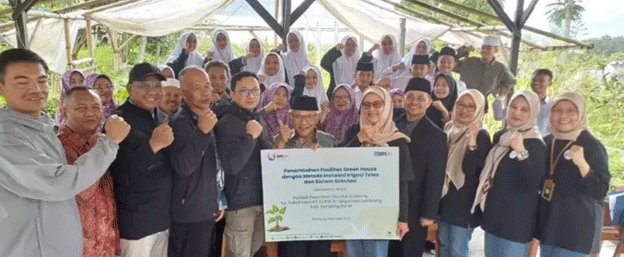The use of greenhouses in tropical agriculture is rapidly transforming farming practices by offering controlled environments that protect crops from unpredictable weather conditions, such as heavy rains and strong winds. These structures, made from transparent materials like glass or plastic, allow sunlight to penetrate while maintaining an optimal microclimate for plant growth.
In a notable initiative, BRI Life partnered with Pondok Pesantren Toyyiba Al Islamy in Lembang, West Java, to develop advanced greenhouse facilities, complete with drip irrigation and circulation systems. This project, initiated in December 2024, aims to boost vegetable production and shorten the harvest cycle to just 20 days.
Greenhouses offer immense benefits, particularly in regions with extreme climates or limited growing seasons. By maintaining a consistent internal environment, they enable farmers to cultivate crops year-round, unaffected by external weather conditions. According to the Food and Agriculture Organization (FAO), controlled-environment agriculture (CEA) systems, including greenhouses, can increase crop yields by up to 30% while reducing water usage by 50-70% compared to traditional open-field farming.
In addition to higher yields, greenhouse farming minimizes pest and disease risks, significantly reducing the need for chemical pesticides. This leads to healthier produce and lower environmental impact. The adoption of drip irrigation further enhances water efficiency and ensures consistent nutrient delivery to plants, fostering faster growth and higher-quality harvests.
BRI Life’s greenhouse initiative is part of its broader Corporate Social Responsibility (CSR) program, focusing on sustainable development. The company supports small and medium enterprises (SMEs), green technology, and reforestation efforts. Ade Nasution, Corporate Secretary of BRI Life, highlighted the importance of integrating advanced agricultural technologies to enhance food security and improve farmers’ livelihoods.
In addition to improving productivity, this initiative introduces modern farming methods to local farmers, fostering knowledge exchange and technical skill development. The program aligns with Indonesia’s Sustainable Development Goals (SDGs), promoting economic growth, environmental sustainability, and social equity.
Greenhouse technology is a game-changer for tropical agriculture, offering farmers a solution to climate challenges and boosting productivity. By enabling year-round cultivation, reducing reliance on pesticides, and improving water efficiency, greenhouses pave the way for a sustainable and profitable agricultural future. Partnerships like the one between BRI Life and local communities showcase the potential for innovative solutions to drive both economic and environmental progress in agriculture.









